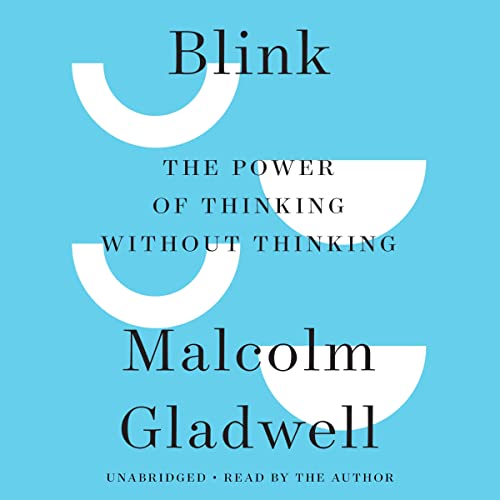
 Audible sample
Audible sample  Playing...
Playing... 
 Paused
Paused  Your audiobook is waiting!
Your audiobook is waiting!
Enjoy a free trial on us
$0.00$0.00
- Click above for unlimited listening to select audiobooks, Audible Originals, and podcasts.
- One credit a month to pick any title from our entire premium selection — yours to keep (you'll use your first credit now).
- You will get an email reminder before your trial ends.
- $14.95$14.95 a month after 30 days. Cancel online anytime.
Buy
-13% $18.24$18.24
Talking to Strangers: What We Should Know About the People We Don't Know
 Audible Audiobook
– Unabridged
Audible Audiobook
– Unabridged
Malcolm Gladwell, host of the podcast Revisionist History and author of the number-one New York Times best seller Outliers, reinvents the audiobook in this immersive production of Talking to Strangers, a powerful examination of our interactions with people we don’t know.
How did Fidel Castro fool the CIA for a generation? Why did Neville Chamberlain think he could trust Adolf Hitler? Why are campus sexual assaults on the rise? Do television sitcoms teach us something about the way we relate to each other that isn't true?
While tackling these questions, Malcolm Gladwell was not solely writing a book for the page. He was also producing for the ear. In the audiobook version of Talking to Strangers, you’ll hear the voices of people he interviewed - scientists, criminologists, military psychologists. Court transcripts are brought to life with re-enactments. You actually hear the contentious arrest of Sandra Bland by the side of the road in Texas. As Gladwell revisits the deceptions of Bernie Madoff, the trial of Amanda Knox, and the suicide of Sylvia Plath, you hear directly from many of the players in these real-life tragedies. There’s even a theme song - Janelle Monae’s “Hell You Talmbout”.
Something is very wrong, Gladwell argues, with the tools and strategies we use to make sense of people we don't know. And because we don't know how to talk to strangers, we are inviting conflict and misunderstanding in ways that have a profound effect on our lives and our world.
The audiobook edition of Talking to Strangers was an instant number-one best seller, and was one of the most pre-ordered audiobooks in history. It seamlessly marries audiobooks and podcasts, creating a completely new and real listening experience.
- Listening Length8 hours and 42 minutes
- Audible release dateSeptember 10, 2019
- LanguageEnglish
- ASINB07NJCG1XS
- VersionUnabridged
- Program TypeAudiobook
People who viewed this also viewed
- Audible Audiobook
- Audible Audiobook
- Audible Audiobook
- Audible Audiobook
- Audible Audiobook
People who bought this also bought
- Audible Audiobook
- Audible Audiobook
- Audible Audiobook
- Audible Audiobook
- Audible Audiobook
Related to this topic
- Audible Audiobook
- Audible Audiobook
- Audible Audiobook
- Audible Audiobook
- Audible Audiobook
Product details
| Listening Length | 8 hours and 42 minutes |
|---|---|
| Author | Malcolm Gladwell |
| Narrator | Malcolm Gladwell |
| Audible.com Release Date | September 10, 2019 |
| Publisher | Hachette Audio |
| Program Type | Audiobook |
| Version | Unabridged |
| Language | English |
| ASIN | B07NJCG1XS |
| Best Sellers Rank | #475 in Audible Books & Originals (See Top 100 in Audible Books & Originals) #5 in Medical Social Psychology & Interactions #6 in Social Psychology #7 in Social Sciences (Audible Books & Originals) |
Customer reviews
Customer Reviews, including Product Star Ratings help customers to learn more about the product and decide whether it is the right product for them.
To calculate the overall star rating and percentage breakdown by star, we don’t use a simple average. Instead, our system considers things like how recent a review is and if the reviewer bought the item on Amazon. It also analyzed reviews to verify trustworthiness.
Learn more how customers reviews work on AmazonReviews with images
-
Top reviews
Top reviews from the United States
There was a problem filtering reviews right now. Please try again later.
I have read many of Malcolm Gladwell books, (The tipping Point, Blink, Outliers) luckily, he has maintained the same level in all his books to date. They are always page turners, revealing, interesting, captivating, and compel the reader to want to learn more about the topic and never boring informative.
An amazing technique used by the author is the short stories that are the bait that clings you to the book and makes the scientific theories, tables, graphs and facts that lie in the coming page exciting and fun to read as they come in with the moral, and science DEDUCED from the story.
The theories don’t come in boring jargon but in real life events with real people, names, places, and events that end with a scientific conclusion that is a piece of the puzzle to get to the final conclusion. Such as giving the famous show FRIENDS as an example, or his father reading Charles Dickens to him as a kid.
The style is BRILLIANT! going about with short chapters telling us an amazing story with the science on the margin.
No matter how much you can benefit from the book, and the load of information, high or low, the bottom line is that you will enjoy it. I encourage reading, it will open your eyes on the old prevailing beliefs that have led us to wrongly judge people and how bad we are at detecting lies.
Malcolm Gladwell’s books are 3 in 1: they are Biographic, Scientific Novels!
On the conundrum of talking to strangers:
“To assume the best about another is the trait that has created modern society. Those occasions when our trusting nature gets violated are tragic. But the alternative—to abandon trust as a defense against predation and deception—is worse.”






























